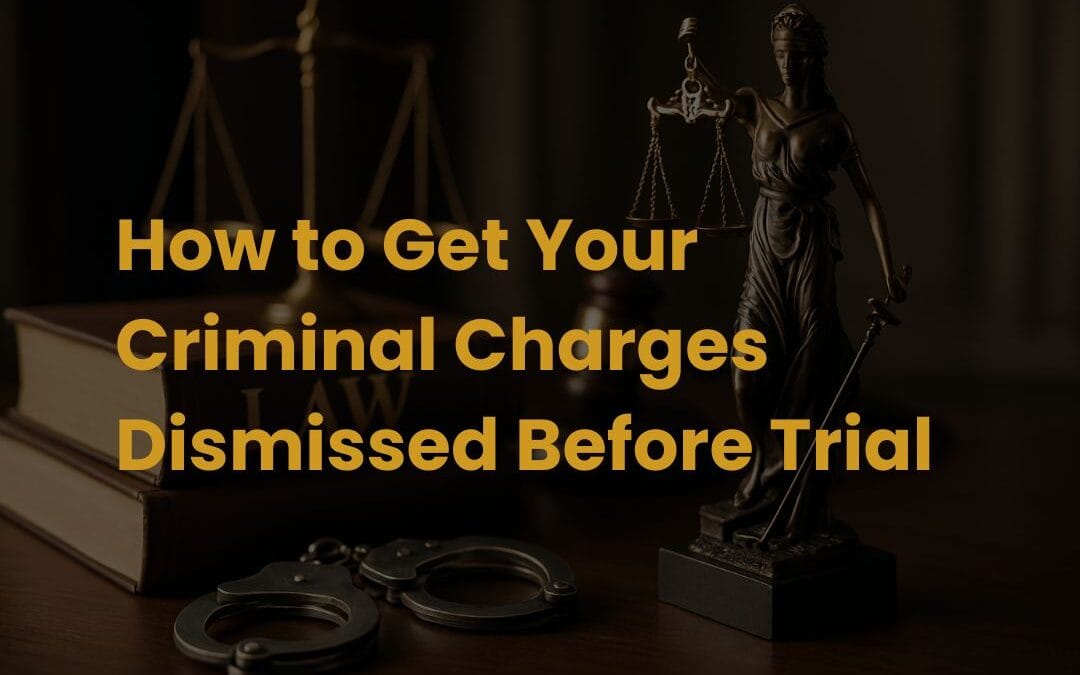Being charged with a crime can be overwhelming, but it’s important to remember that a charge is not a conviction. Many cases get dismissed before trial due to insufficient evidence, legal errors, or constitutional violations. Understanding your legal options and how to challenge charges can make a critical difference in your case outcome. This guide explores key strategies your attorney may use to get criminal charges dismissed and protect your rights.
Page Contents
Key Strategies to Get Charges Dismissed
1. Lack of Probable Cause
Law enforcement must have probable cause to arrest or detain you. Probable cause means there is a reasonable basis for believing a crime has been committed and you are connected to it. If the arresting officers acted without sufficient evidence or justification, your attorney can challenge the legality of your arrest.
-
Your lawyer will carefully review arrest reports, police body cam footage, and witness statements to find inconsistencies or lack of probable cause.
-
If unlawful arrest is established, your attorney may file a motion to dismiss the charges on these grounds.
2. Insufficient Evidence
The prosecution has the burden to prove your guilt beyond a reasonable doubt. If the evidence is weak, incomplete, or flawed, your attorney can argue for dismissal.
-
Evidence that is circumstantial, contradictory, or collected improperly can be challenged.
-
Witness testimony inconsistencies or unreliable eyewitness accounts weaken the prosecution’s case.
-
Your defense attorney may file a motion arguing that the prosecution’s evidence does not meet the legal standard for conviction.
3. Violations of Constitutional Rights
Your constitutional rights protect you during criminal investigations and prosecutions. If violated, it may be grounds for dismissal or suppression of evidence.
-
Fourth Amendment violations: Illegal searches and seizures without a warrant or probable cause may lead to a motion to suppress unlawfully obtained evidence.
-
Miranda rights violations: Police must inform you of your right to remain silent and have an attorney present. Statements made without proper Miranda warnings can be inadmissible.
-
Right to due process: Any procedural irregularities that violate fairness can be challenged.
4. Procedural Errors and Prosecutorial Misconduct
Sometimes cases get dismissed because of errors or misconduct during the legal process.
-
Procedural errors such as improper arrest procedures, missing or faulty paperwork, or failure to follow court rules can invalidate the case.
-
Prosecutorial misconduct — including withholding evidence favorable to the defense (exculpatory evidence) — is a serious violation that can lead to dismissal.
-
Your lawyer will scrutinize the entire case file for such issues and take appropriate legal actions.
Legal Motions That Can Lead to Dismissal
Motion to Dismiss
This is a formal request made by your defense attorney asking the court to throw out charges due to lack of evidence, legal defects, or violations of your rights.
-
Motions to dismiss may be filed before or during trial.
-
Success depends on strong legal arguments and supporting facts.
Motion to Suppress Evidence
If critical evidence was obtained unlawfully, your lawyer can ask the court to exclude that evidence from trial.
-
Suppressing key evidence can severely weaken the prosecution’s case.
-
Sometimes, it results in the entire case being dismissed.
Pretrial Diversion Programs
In some jurisdictions, first-time or low-risk offenders may qualify for diversion programs.
-
These programs allow defendants to complete counseling, community service, or probation instead of going to trial.
-
Successful completion usually results in charges being dropped and no conviction on record.
The Role of a Criminal Defense Attorney in Dismissals
Hiring an experienced criminal defense lawyer is crucial when facing charges.
-
Attorneys thoroughly investigate your case, gathering evidence and identifying weaknesses in the prosecution’s case.
-
They negotiate with prosecutors to explore dismissals, plea bargains, or alternative resolutions.
-
Defense lawyers file necessary motions and represent you vigorously in court.
-
They also advise on your rights and help you make informed decisions.
Protecting Your Future After Dismissal
Even if charges are dismissed, you may want to take additional steps:
-
Expungement: This legal process clears your criminal record, improving job prospects, housing applications, and reputation.
-
Your attorney can guide you through expungement or sealing records where applicable.
-
Staying informed and legally prepared safeguards your rights long term.
When Should You Seek Legal Help?
-
Immediately after being charged or arrested.
-
If law enforcement is investigating you.
-
Before speaking to police or prosecutors.
-
If you want to challenge evidence or file motions.
Conclusion: Don’t Wait to Fight Your Charges
Facing criminal charges is serious, but dismissal is possible with the right legal support. Understanding the law, protecting your rights, and hiring a skilled criminal defense attorney can change the outcome of your case. Don’t delay — contact Hallinan Law Firm today at (415) 837-3449 for a confidential consultation and start building your defense.

